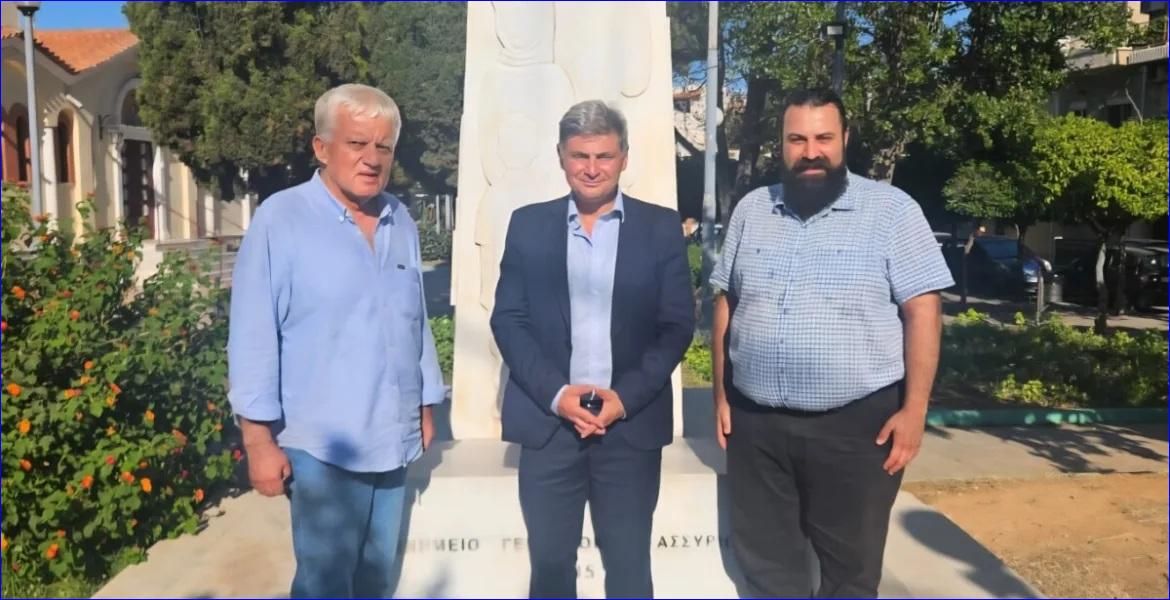


Related: The Assyrian Genocide
The event featured the screening of the documentary "Souls in Transit" about the genocide of all Christian peoples of the East (Assyrians, Greeks, and Armenians) by award-winning director Aida Schlaepfer, who is in Greece for the presentation of the film.
The documentary Souls in Transit, nominated for an Oscar in 2023, has won an award at the Cannes Film Festival and has been presented at the European Parliament.
Opening the event, MEP Nicholas Farantouris, who visited Syria in the midst of the great massacres last March, said:
"I welcome you, my fellow Greek Assyrians, from all parts of Greece and from all parts of the world, to speak out and restore the historical truth about the genocide of the Christian peoples of the East, the Assyrians, the Pontic Greeks, the Armenians. The Assyrians, a proud people, bearers of culture for over 5,000 years, from Mesopotamia and around the world, their history brought them so close to Hellenism that their fates were intertwined in difficult times, persecutions, ethnic cleansings and ultimately genocide. We are here to restore historical truth. We are here to join forces. I, from my position in the European Parliament and in every corner of Europe and the entire world, both the West and the East, and all together, with historical truth as an ally. Because nothing can move forward if we have not settled old scores of the past. We are here only for the truth, without a disposition of hatred, intolerance and hostility. But the truth must be restored and it is the duty of our own generation to go back and remember the suffering that our ancestors suffered."
Nikolas Farantouris, as a member of the Security and Defense Committee and coordinator of the Constitutional Affairs Committee of the European Parliament, has advocated the recognition of the Greek and Assyrian genocide as a whole and has advocated for the safety of Christians in Syria.
In July, the MEP met with the President of the Assyrian community, Kyriakos Batsaras, and Iraq-based Professor Nicholas Al-Jeloo to discuss advocacy for Assyrian Genocide recognition and to raise the issue of the plight of the Assyrian communities in Iraq, Turkey and elsewhere.
The Assyrian Christians
The Assyrian civilization dates back to approximately 2500 BC in present-day Iraq and had its capital at Nineveh, near the city of Mosul.
In the 19th and early 20th centuries, the Assyrians numbered around 3.5 to 4 million and lived in the Ottoman provinces of Anatolia, Iraq, Syria, Iran, and the Russian Caucasus (Armenia and Georgia). During World War I, the Assyrians, like the Armenians and the Anatolian Greeks, were victims of systematic ethnic-religious purges by the Ottoman regime as part of the pantheon of plans to unify the "Turks" of Anatolia, the Caucasus, and Central Asia.
The Treaty of Sèvres in 1920 provided for a relative autonomy for the Assyrians, whose delegations had participated in the peace conferences demanding the establishment of an Assyrian state, which had been promised by London in December 1917. However, the Treaty of Lausanne in 1923 put an end to the dream of independence for both the Assyrians, the Armenians and the Kurds, all of whom were victims of geopolitical designs and the division of the Middle East between Kemalist Turkey, France (mandate in Syria-Lebanon) and England (mandate in Iraq, Transjordan and Palestine).
The Assyrian Genocide
During World War I. The Assyrian population of upper Mesopotamia (Tur Abdin, Hakkari, Van, Siirt, i.e. areas of present-day southeastern Turkey and Urmia, a region of northwestern Iran) was forcibly displaced and massacred by Turkish and Kurdish forces between 1914 and 1920 in the same way as the Armenians and Greeks.
Estimates of the total number of Assyrian deaths vary. Some reports put the number of victims at 250,000, although recent estimates put the number of dead at 500 to 750,000.
In 2007, the International Association of Genocide Scholars concluded that "the Ottoman campaign against Christian minorities of the Empire between 1914 and 1923 constituted a genocide against Armenians, Assyrians, and Pontian and Anatolian Greeks."
The Assyrian diaspora
Today, after many centuries of presence in the territories of present-day Turkey and Iraq, the remaining Assyrians are under the direct threat of the Islamic State. Many have already emigrated abroad, to France (Paris and Marseille), Germany, Sweden, the USA.
In Greece, Assyrians of Riastina are in Thessaloniki, Kilkis, Serres, Katerini, Argos, and Athens, (in the municipalities of Peristeri, Nikaia, Moschato and Egaleo).
In Egaleo, the Panhellenic Assyrian Union also has its headquarters, in a privately owned building (Sampsountos 6), which houses the Cultural Center, the library, and the community Church, while in one of the city's central squares, there is an impressive monument, "dedicated to the victims of the Assyrian Genocide."

or register to post a comment.